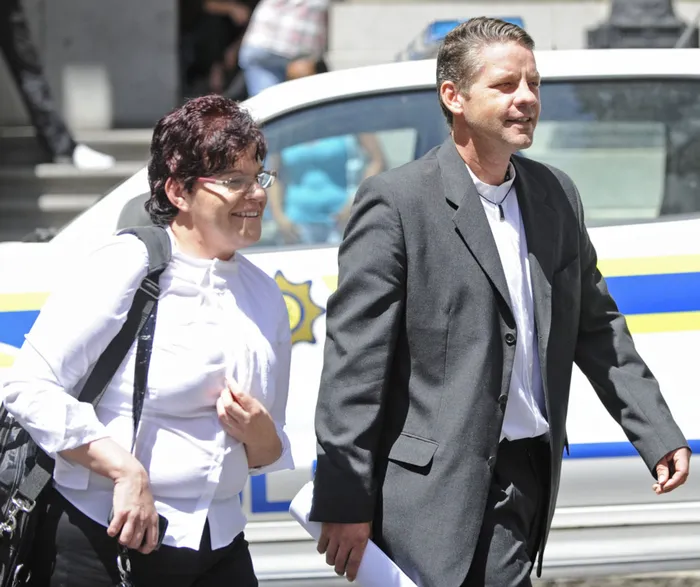
Cape Town - 120223 - J Arthur Brown and his attorney June Marks leave the Western Cape High Court building - Photo: Matthew Jordaan Cape Town - 120223 - J Arthur Brown and his attorney June Marks leave the Western Cape High Court building - Photo: Matthew Jordaan
J Arthur Brown has accused Fidentia’s curators of selling off assets illegally and lying about the distribution of more than R100 million in funds to the Living Hands Umbrella Trust, during a High Court application to decide on the distribution of a further R136m held by the curators.
The Financial Services Board (FSB) and Brown were in front of Judge Elizabeth Baartman on Thursday to decide whether R136m recovered by the curators should be distributed pro rata among the four investors in Fidentia.
The Living Hands Umbrella Trust, the Transport Education and Training Authority (Teta) the Antheru Investment Trust and Baltron lost investments worth more than R1 billion when Fidentia and its associated companies collapsed.
Brown and five others, including the JAW Brown Family Trust and Antheru, are opposing the disbursement of the funds.
Brown, represented by June Marks on a pro bono basis, claims that the money was recovered by the curators, who “raided” companies not covered by the curatorship court order. The curators also sold assets at below their true values, and more than R100m, which was to have been distributed to the Living Hands Umbrella Trust, was never received by it.
In his papers, Brown states that certain trustees of the Living Hands Umbrella Trust were “adamant” that they had never received such payment. He also states that the curators and the trust needed to be audited.
Antheru is opposing the application as it is disputing the value of their claim.
However Derek Mitchell, for the FSB, charged that Brown was using these arguments as a “smokescreen” to “confuse and to conceal”.
He said the assets sold in related companies such as Bramber “belong to the investors”, and that the way in which the funds were mixed meant the money would have to be distributed pro rata, as there was no indication of which assets belonged to which investors.
Mitchell also stated that the valuation of the assets done by Ernst and Young, on which Brown relied, had been based on “historical” data provided to the company, and had not been independently verified by them.
He also stated that the evidence on which Brown had based his claims of missing funds was “flimsy”, saying “Brown has no personal knowledge of whether or not that money was paid”.
Brown has also now made claims that there was indemnity insurance covering investors.
But Mitchell argued that “This reveals a pattern where Mr Brown makes these categoric statements with reference to annexures that are either not there, or don’t say what he says they do. This is not the way to litigate.”
Mitchell said the first thing the curators did was to check with the insurance company, which had indicated there was no cover.
“For Mr Brown to come along now and say there was insurance is another example of how he wants to confuse rather than clarify.
“Now, having made these charges, he says the FSB must afford him a full auditing of the curators and of the Living Hands Umbrella Trust. Mr Brown is not entitled to it. The trustees are entitled to it.”
Baartman adjourned proceedings on Thursday afternoon to allow Marks time to photocopy a full set of court papers. Marks indicated that as she had taken on the case pro bono, she had not had the funds to photocopy the full court file.
Marks however indicated that the court order sanctioning the curatorship did not allow for the curators to enter subsidiary companies without a court order. She also argued that the investors held no claim over Bramber’s assets, as their money had purchased shares in this company, and not assets.
The case continues on Monday.
[email protected] - Weekend Argus